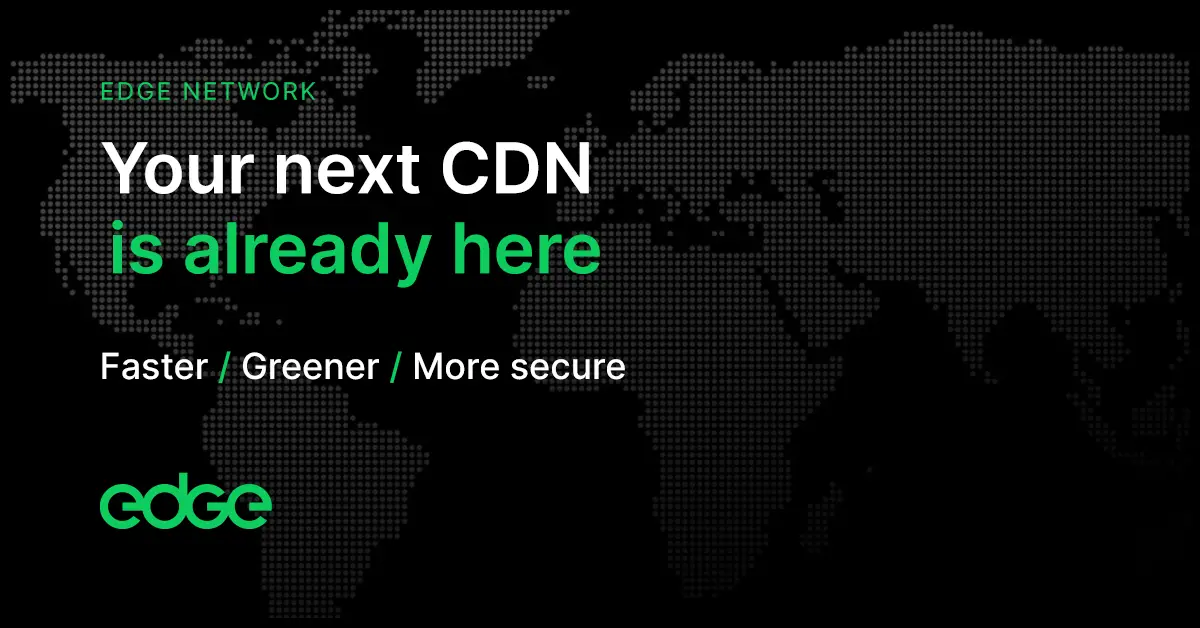Predictions for the Next Decade of CDN

Content delivery networks (CDNs) have become an essential component of the internet, delivering content to end users with speed, reliability, and security. As the internet continues to evolve, so too will the role of CDNs. Here are some predictions for the future of CDN over the next decade:

1. Increased Demand for Video Delivery:

- Video consumption will continue to rise, driven by the popularity of streaming services, social media, and user-generated content. CDNs will play a critical role in delivering high-quality, low-latency video to users across devices.
2. Edge Computing Adoption:
- Edge computing brings computational resources closer to end users, reducing latency and improving performance. CDNs will increasingly adopt edge computing technologies to deliver content more efficiently and support real-time applications.
3. AI and Machine Learning for Content Optimization:
- Artificial intelligence (AI) and machine learning (ML) algorithms will be used to optimize content delivery, predicting user behavior and adjusting CDN configurations in real-time to enhance performance.
4. Enhanced Security and Privacy:
- CDNs will continue to prioritize security, with advanced encryption techniques, DDoS mitigation, and threat detection capabilities to protect user data and prevent malicious attacks. Privacy-preserving technologies will also become more prevalent.
5. Integration with Cloud Services:
- CDNs will become tightly integrated with cloud computing platforms, providing seamless content delivery from cloud-based storage and applications. This will simplify infrastructure management and enable hybrid cloud deployments.
6. Global Expansion and Local Presence:
- CDNs will continue to expand their global presence, establishing edge nodes in more regions to reduce latency and provide localized content experiences. Local presence will become crucial for delivering high-quality content to users in emerging markets.
7. Personalization and Adaptive Delivery:
- CDNs will leverage personalization technologies to tailor content delivery based on user preferences, device capabilities, and location. Adaptive delivery techniques will optimize content bitrates and formats to match individual user requirements.
8. Emerging Technologies:
- CDNs will embrace emerging technologies such as blockchain and 5G networks to improve content security, accelerate delivery speeds, and support new use cases.
9. Subscription-Based Models:
- CDNs may shift towards subscription-based pricing models, offering premium services, such as enhanced performance, advanced analytics, or customized content delivery solutions.
10. Sustainability and Environmental Impact:
- CDNs will prioritize sustainable practices by optimizing energy consumption, reducing carbon footprint, and using renewable energy sources to reduce their environmental impact.
These predictions highlight the evolving role of CDNs in the future of the internet, driving innovation, enhancing performance, and meeting the growing demands of content consumers worldwide. As technology continues to advance, CDNs will adapt and evolve to remain a cornerstone of the internet infrastructure.## The Future Of CDN: Predictions For The Next Decade
Executive Summary
The CDN industry is on the cusp of a major transformation. Driven by the proliferation of streaming media, the rise of mobile devices, and the increasing demand for high-quality online experiences, CDNs are evolving to meet the changing needs of businesses and consumers. This report provides an overview of emerging trends and innovations in the CDN space, with expert insights into how these developments will shape the future of the industry over the next decade.
Introduction
Content delivery networks (CDNs) have become an essential part of the Internet infrastructure, delivering content to users from geographically distributed servers to improve performance and reduce latency. As the demand for high-quality online experiences continues to grow, CDNs are playing an increasingly important role in ensuring that websites, videos, and other content are delivered to users quickly and reliably.
FAQs
- What is a CDN?
A CDN is a network of servers distributed across multiple locations that work together to deliver content to users from the closest server, reducing latency and improving performance.
- What are the benefits of using a CDN?
CDNs offer several benefits, including:
-
Improved website performance
-
Reduced latency
-
Increased reliability
-
Enhanced security
-
Improved SEO
-
How much does a CDN cost?
CDN pricing varies depending on the provider and the package you choose. Some providers offer tiered pricing plans, while others offer customized solutions based on your specific requirements.
Top 5 Subtopics
Edge Computing
Edge computing brings computation and data storage closer to the end user, reducing latency and improving performance. This is becoming increasingly important for applications that require real-time processing, such as gaming, video conferencing, and IoT devices.
- Key points:
- Reduced latency
- Improved performance
- Enhanced security
- Increased reliability
5G Networks
The rollout of 5G networks is expected to have a major impact on the CDN industry. 5G’s low latency and high bandwidth will enable new applications and use cases, such as virtual reality, augmented reality, and self-driving cars.
- Key points:
- Reduced latency
- Increased bandwidth
- Improved performance
- New applications and use cases
Artificial Intelligence (AI)
AI is increasingly being used to optimize CDN performance. AI-powered algorithms can analyze user behavior, network conditions, and content characteristics to make real-time decisions about how to deliver content in the most efficient way possible.
- Key points:
- Improved performance
- Increased efficiency
- Reduced costs
- Enhanced security
Security
Security is a top concern for businesses and consumers alike. CDNs play an important role in protecting online content from cyber threats. They can use advanced security features, such as encryption, DDoS protection, and web application firewalls, to keep content safe and secure.
- Key points:
- Enhanced security
- Reduced risk of cyber attacks
- Protection of sensitive data
- Compliance with regulations
Streaming Media
Streaming media is one of the most popular and fastest-growing applications for CDNs. CDNs are essential for delivering high-quality streaming video to users around the world, without buffering or interruptions.
- Key points:
- Reduced buffering
- Improved video quality
- Increased scalability
- Enhanced user experience
Conclusion
The CDN industry is poised for significant growth and innovation over the next decade. Emerging technologies, such as edge computing, 5G networks, and AI, are transforming the way CDNs deliver content to users. By embracing these innovations, CDNs can continue to play a vital role in ensuring that the Internet remains a fast, reliable, and secure place for everyone.
Keyword Tags
- Content delivery networks
- CDN
- Edge computing
- 5G
- Streaming media
